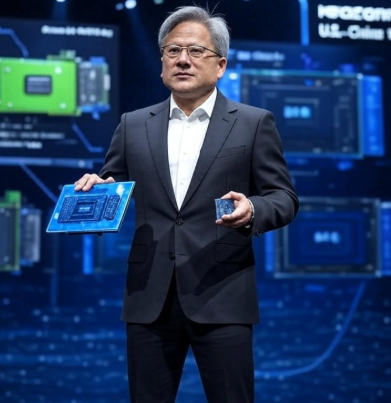When Alexandr Wang stepped down as CEO of Scale AI in June 2025 to join Meta’s new “superintelligence” division, the tech world took notice. At just 28 years old, this New Mexico native once the world’s youngest self-made billionaire has already left an indelible mark on artificial intelligence. His journey from a curious kid in Los Alamos to a key player in Meta’s ambitious AI plans is a story of ambition, innovation, and a relentless drive to shape the future. A recent interview with TIME magazine, conducted before his big move, offers a peek into his mind, his leadership style, and his vision for AI’s potential and its pitfalls. Let’s dive into how this young entrepreneur is steering the AI revolution and what it means for the tech landscape in 2025.
A Kid with Big Dreams
Alexandr Wang’s story begins in Los Alamos, New Mexico, a town famous for the Manhattan Project and its legacy of scientific breakthroughs. Born to Chinese immigrant parents who worked as physicists at the Los Alamos National Laboratory, Wang grew up surrounded by brilliant minds and cutting-edge ideas. Math and programming were his playgrounds, and by his teens, he was racking up achievements like qualifying for the Math Olympiad and excelling in coding competitions. At 17, he skipped the traditional college route, landing software engineering jobs at Addepar and Quora in Silicon Valley before briefly attending MIT.
But Wang wasn’t content to follow someone else’s path. At 19, he dropped out of MIT to co-found Scale AI in 2016 with Lucy Guo. The idea was simple yet bold: build a platform to provide high-quality data for AI systems, a critical but often overlooked piece of the puzzle. Back then, AI was buzzing with promise Google’s TensorFlow and DeepMind’s AlphaGo were making headlines but Wang saw that progress depended on data. His hunch paid off. By 2021, Scale AI’s valuation hit $7.3 billion, and Wang became a billionaire, owning a significant stake in the company.
Building Scale AI from Scratch
Scale AI started small, but Wang’s vision was anything but. He believed AI needed an infrastructure platform, much like AWS for cloud computing or Stripe for payments, to handle the massive data demands of machine learning. The company quickly became a go-to for giants like OpenAI, General Motors, and the U.S. government, labeling data for everything from autonomous vehicles to military AI projects. Wang’s hands-on leadership style taking one-on-one calls with every new employee even as the team grew into the hundreds set the tone for a culture of ambition and detail.
In the TIME interview, Wang reflected on how his leadership evolved. He described it as a three-level game: first, getting the basics right; second, ensuring you’re heading in the right direction; and third, shaping the company’s culture. “Leadership is multifaceted,” he said, emphasizing the importance of building a team that shares his drive. This approach helped Scale secure over $350 million in defense contracts and work with the Pentagon to test AI models for safety and reliability. Wang’s roots in Los Alamos, where his parents worked on national security tech, clearly influenced his focus on AI’s strategic importance.
The Move to Meta and a $14.3 Billion Deal
The tech world was stunned in June 2025 when Meta announced a $14.3 billion investment for a 49% stake in Scale AI, with Wang stepping into a new role at Meta’s “superintelligence” division. This wasn’t just a business deal it was a power move. Meta, struggling to keep up with AI rivals like OpenAI and Chinese firms like DeepSeek, saw Wang as the key to regaining ground. His knack for networking honed during his pandemic roommate days with OpenAI’s Sam Altman—paid off, landing him a spot reporting to Mark Zuckerberg.
Wang’s departure from Scale AI wasn’t a retreat; it was a pivot to a bigger stage. In a memo to employees, he promised to stay on as a director to support Scale’s mission, while Jason Droege took over as CEO. The deal ensures Scale’s independence, with Meta gaining no voting power, but it’s clear Wang’s expertise is the real prize. His ability to navigate the AI ecosystem working with everyone from OpenAI to the DoD makes him a rare asset in the race for artificial general intelligence (AGI).
AI’s Potential and Its “Deficiencies”
In his TIME interview, Wang didn’t shy away from the big questions about AI. He’s optimistic about its potential, pointing to its rapid progress across industries like healthcare and autonomous driving. “AI is the most important technological advancement of our time,” he told TIME, echoing a belief that’s driven his career. But he’s also candid about its limits. Models still “hallucinate” (spout nonsense), struggle with reasoning, and falter with tool use. Starting a company betting on these problems disappearing, he warned, is a risky move.
This balance of enthusiasm and caution defines Wang’s approach. He sees AI as a tool that can transform society, but only if we tackle its weaknesses head-on. His work at Scale AI focused on solving the “data wall” the realization that the internet’s existing data is nearly exhausted, forcing the industry to find new sources. At Meta, he’s likely to push for innovative data strategies to fuel the next generation of AI models.
The U.S.-China AI Race
Wang’s perspective isn’t just technical it’s geopolitical. Growing up in Los Alamos gave him a front-row seat to how technology shapes national security. In 2023, he testified before Congress, advocating for U.S. leadership in AI amid rising competition from China. His meetings with world leaders like Narendra Modi and Emmanuel Macron in 2025 underscore his belief that AI is a global battleground. “America must win the AI war,” he wrote in a letter to President Trump, a stance that aligns with his work on Pentagon contracts.
This focus on competition isn’t just talk. Wang’s experience with Scale AI’s defense projects shows he understands AI’s military implications. Yet, his move to Meta raises questions about how his priorities might shift. Will he balance commercial innovation with national security, or will Meta’s goals take precedence? For now, his track record suggests he’ll keep pushing the U.S. edge in AI.
The Trade-Offs of Ambition
Wang’s rise hasn’t been flawless. His relentless focus on growth sometimes clashed with operational details. Lucy Guo, his co-founder, left in 2018 over disagreements, citing delayed payments to Scale’s 240,000 contract workers. Wang admitted in the interview that his early leadership leaned heavily on ambition, sometimes at the expense of execution. “I was more concerned with growth,” he said, acknowledging the tension between vision and practicality.
This trade-off has shaped his legacy. Admired by figures like Sam Altman for his drive, Wang has also faced criticism for prioritizing scale over people. His move to Meta, backed by a $5 billion personal windfall, might amplify this dynamic. As he tackles superintelligence, will he refine his approach to include the human element, or will his focus remain on the big picture?
What’s Next for AI and Wang?
As of June 2025, Wang’s new role at Meta puts him at the forefront of the AI race. Meta’s investment in Scale AI ensures continued data innovation, while Wang’s leadership could accelerate Meta’s lagging AI efforts. The “superintelligence” division hints at a push for AGI, AI that rivals human intelligence a goal that could redefine tech in the coming decade.
For the broader industry, Wang’s journey offers lessons. His success with Scale AI shows the power of niche expertise, data infrastructure in a crowded field. His move to Meta highlights the value of talent in a winner-takes-all market. And his warnings about AI’s deficiencies remind us that the technology’s promise comes with real challenges.
Wang’s story is still unfolding. From a small startup to a Meta powerhouse, he’s proven that age is no barrier to impact. As he works to build smarter-than-human AI, the world will be watching, both for the breakthroughs and the trade-offs. One thing’s clear: Alexandr Wang isn’t done shaping the future yet.
Sources: Insights drawn from personal experiences and reflections shared in the TIME interview, June 2025.



